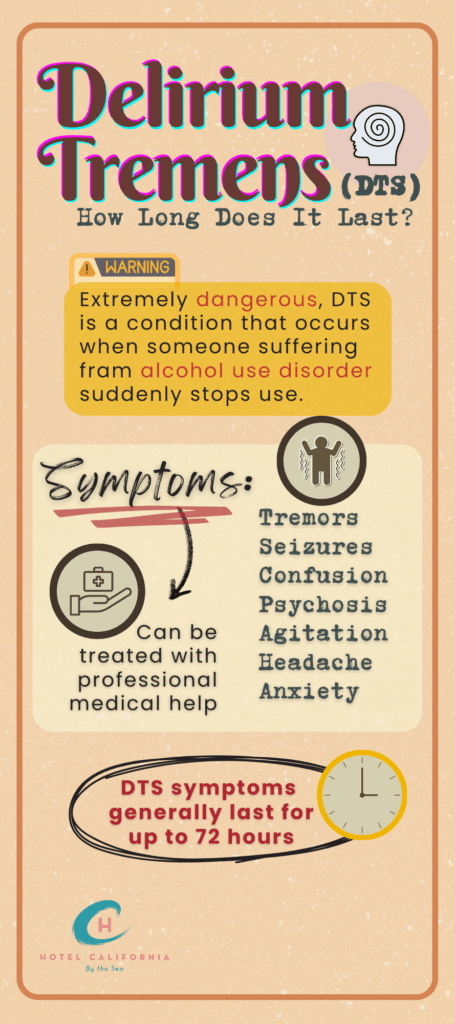How long do DTS last?
Delirium tremens or DTS, is a condition that occurs when someone with an alcohol use disorder suddenly stops drinking alcohol. It is a form of severe alcohol withdrawal. How long do DTS last? The duration of this type of serious withdrawal is dependent on many factors including the severity of alcohol addiction, a person’s age, their history of alcohol use and if other substances were used alongside alcohol.

Alcohol use disorder is common. An estimated 29% of adults in the US will meet the criteria for alcohol use disorder at some point in their lives. An estimated 3-5% of people will experience delirium tremens when quitting heavy alcohol use. The lifetime risk of a person developing delirium tremens is about 5-10%.
DTS is an extremely dangerous condition with long-term effects. It falls under the category of the most severe when it comes to dealing with alcohol withdrawal symptoms. If you suspect you or a loved one may be experiencing DTS, it is an emergency and you should seek medical attention right away.
What are Delirium Tremens?
Delirium tremens are the most severe side effects of alcohol withdrawal. Which, if left untreated, can result in death. It is a clinical condition comprised of symptoms of both delirium and alcohol withdrawal. It is characterized by an altered mental state and elevated blood pressure.
A person is more likely at risk for developing DTS if they are heavy drinkers and have been drinking heavily over a long span of time.
The main cause of DTS is when a person abruptly stops drinking alcohol or significantly reduces alcohol intake after heavy, long-term alcohol consumption.
Alcohol acts on the GABA neurochemicals in the brain. GABA is an inhibitory neurotransmitter that slows down excitatory functions in the brain and body. It’s one of the reasons alcohol can produce temporary feelings of reduced anxiety.
When drinking has stopped, it causes the alcohol to let go of its pull on the central nervous system. When there is nothing there to pull back on it, it can cause an extreme imbalance, resulting in negative responses in the brain and body. These responses come in the form of withdrawal symptoms. Extreme responses are delirium tremens.

Risk Factors for Delirium Tremens
- A person’s history with alcohol withdrawal
- A person’s history with seizures and DTS
- Multiple attempts at stopping heavy alcohol use
- Heavy alcohol intake
- The use of other substances
- Age
- History of other medical issues or underlying medical disorders
- Co-occurring mental health conditions
- Nutritional deficiencies – low potassium or low platelets
- Previous treatment for alcohol detox
Check Your Insurance Coverage for FREE
Find out if your insurance covers addiction treatment in minutes. We accept most insurance!
How long do DTS last?
Delirium tremens usually develops within 48-72 hours after cessation of heavy drinking. In some cases of severe withdrawal, it can even be noticed within 6 hours after drinking has stopped. It is usually followed by hallucinations around 12-24 hours after. Symptoms of DTS generally last for up to 72 hours. It is a short-lasting condition. However, the duration is dependent on the severity of alcohol withdrawal. Some people may even experience symptoms lasting up to 2 weeks. Despite its short nature, it is also a very dangerous condition.
Symptoms of DTS
- Tremors or shakes – it is the most common symptom and mostly appears in your hands
- Confusion – it is a form of delirium specific to alcohol withdrawal
- Agitation and anxiety – it can lead to aggressive behaviors
- Psychosis – it can also lead to hallucinations and paranoia
- Sensory disruptions and disorientation – the person will have a reduced awareness of their environment because their senses are not working properly. It can cause people to talk nonsensically and be unaware of where they are or what is happening around them
- Seizures – the most dangerous symptoms that can start even before withdrawal and can turn into delirium tremens
- Heavy sweating and high body temperature
- Headache, nausea and vomiting
- High blood pressure and a fast heart rate
How to diagnose DTS
- Physical examination – A neurological examination with specialized checklists and lab testing can help determine if a person is suffering from DTS.
- Testing organ functions – Testing liver, kidney and heart functions.
- Testing of blood alcohol levels, urine drug tests and electrolyte level tests can also help determine DTS.
- Blood magnesium tests
- Electrocardiograph and electroencephalogram tests can help determine DTS
- A full-on toxicology screening can show signs of DTS
Treatment for DTS
Delirium tremens is not a curable condition. But it is very treatable. There are many options for treating the condition.
Inpatient care and hospitalization. DTS is an extremely dangerous condition that requires a person to seek emergency medical care.
The use of benzodiazepine medications. Benzos can help reduce the symptoms of alcohol withdrawal. Medications like Ativan and diazepam are commonly prescribed to help reduce symptoms of agitation, prevent seizures and help manage other withdrawal side effects.
Diet and nutrition. Changing to a healthy and nutrient-dense diet can help ease withdrawal symptoms. Drinking lots of water and taking supplemental vitamins can help improve dehydration and electrolyte imbalance. These can all help balance out any nutritional deficiencies.
The main goal of long-term treatment is to ensure the safety of the person while they are experiencing DTS and to effectively manage symptoms to prevent further complications. This ultimately can support the recovery from alcohol dependence.
If left untreated, DTS can cause seizures, cardiovascular complications, respiratory failure, infections, organ damage, cognitive impairment, mental health issues and death.
Reach out to Hotel California by the Sea
We specialize in treating addiction and other co-occurring disorders, such as PTSD. Our Admissions specialists are available to walk you through the best options for treating your addiction.
Treatment for Alcohol Use Disorder
An estimated half of patients with alcohol use disorder develop withdrawal symptoms.
Most alcohol withdrawal symptoms can be managed with a care plan and medication under medical detox. But with delirium tremens, it is considered a medical emergency and immediate action should be taken to help treat the condition.
Professional treatment programs like Hotel California by the Sea provide the tools, resources and support clients need to address their alcohol use disorder. We offer treatment at all levels of care including detox, residential, PHP and IOP. We utilize evidence-based treatment methods such as CBT, DBT and EMDR therapy. We help clients reach their goals of sobriety and overcome their addiction.
References:
https://my.clevelandclinic.org/health/diseases/25052-delirium-tremens
https://pmc.ncbi.nlm.nih.gov/articles/PMC6286444
https://www.verywellmind.com/what-is-it-like-to-go-through-alcohol-withdrawals-80193
https://www.addictioncenter.com/alcohol/delirium-tremens
https://www.addictionhelp.com/alcohol/withdrawal-symptoms/delirium-tremens
https://www.promises.com/addiction-blog/can-die-delirium-tremens/
